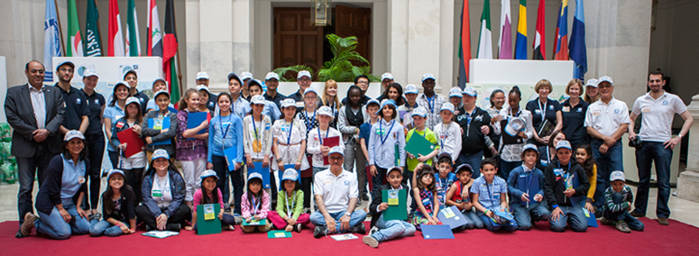We use Cookies. Read our Terms
- News
- OFID launches children's book on sustainable development
OFID launches children's book on sustainable development

OFID Director-General Mr. Suleiman J. Al-Herbish (center, front) with children of OFID and OPEC staff who paricipated in the book launch activities.
May 13, 2013, Vienna, Austria. OFID’s elegant atrium was recently transformed into a hive of boisterous activity for the launch of OFID’s children’s book “One Planet Earth One People.” The beautifully illustrated book, which is designed to be educational, entertaining and motivational, seeks to teach young people aged 8 to 13 about the interrelated issues of environment, poverty and development, and encourage them to act as responsible global citizens to help preserve Planet Earth and its resources for future generations.
The launch event was attended by a large group of children – the sons and daughters of OFID and OPEC staff – for a morning of interactive activities related to the book content.
Speaking to the youngsters before the fun got underway, OFID Director-General, Suleiman J Al-Herbish, urged them to think about the millions of children in the world who did not have enough food or access to clean water, electricity, healthcare and education.
“Keep these facts in mind as you grow up,” he said. “Try to do something to help; try to change the status quo.”
“Along with the opportunities that you have today, there comes responsibility. Your generation is faced with a huge task – how to look after the planet and its resources to make sure that all countries and peoples benefit equally from Mother Nature’s generosity for many years to come. We call this ‘sustainable development.’ Achieving it won’t be easy, as it involves changing attitudes, habits and behaviors, all of them things that, as a rule, people find hard to do. But it can and must be done.”
- Suleiman J Al-Herbish OFID Director-General
Scavenger hunt
The children were then invited to participate in a scavenger hunt to find out facts about the Big Bang and the solar system; about population, diversity and inequality; about natural resources such as food and water, energy access inequalities; and, about the environment.
Clues and answers were to be found at six interactive “learning stations,” where the youngsters, in small groups, were able to engage in a range of entertaining, hands-on educational activities.
To help them, they were equipped with clipboards, “space” pens that could write upside down, and “Responsible Global Citizen” passports. The stations were manned by teams of OFID staff members, who had prepared themselves to answer any and all questions posed by the young investigators.
At the “Universe and Earth” station (pictured right), children examined a model of the solar system and tried to come up with a mnemonic device to remember the order of the planets.
At the “Population” station, each child had to find their home country on a world map and tell the group some interesting facts about it.
Youngsters at the “Food” station learnt about food sources by examining a selection of everyday products to find out where they come from. Many of the children were fascinated to learn how far certain products travel from the country of production to local markets.
The “Water” station saw the children trying to work out how much water was required to produce certain foods and come up with ways to save on water use. Youngsters also learnt how little water is available to people in developing countries compared with the developed world.
At the “Sustainable Development” station, the youngsters had fun sorting through “trash” to see what could be recycled, what was made from recycled material and what was “dangerous” to put directly into the household trash.
By far the most popular activity, however, was the “Energy” station, where the children got to operate a Wimshurst machine to see how much effort was required to produce just a tiny spark of electricity. They were also encouraged to think of how they could cut down on the amount of electricity they use at home, and the fact that many people in the developing world do not have access to electricity and modern fuel sources.
Their discoveries were then logged in their individual “Responsible Global Citizen” passports, which earned a prize upon completion.
The reaction of the children to the morning’s activities was a mixture of surprise and concern, with many of them motivated to change their habits.
Isobel’s journey of discovery
“One Planet Earth One People” is the story of 11 year-old Isobel Rossi from Ireland, whose school project of the same name sees her partnered with Kofi Bediako, a 12 year-old boy in Ghana.
Together, Isobel and Kofi learn about the birth of the universe, how they came to be on Planet Earth, and how all life on Earth is interdependent.
They learn about how we use the planet’s resources to feed and clothe ourselves, to build homes and to manufacture all the products we use every day.
Under the guidance of Professor Marsh, an agricultural scientist and leader of the project, Isobel and her classmates come to understand about poverty and the challenges that developing countries face in trying to provide for their people.
Through email exchanges, Isobel and Kofi learn about each other’s way of life, discover their differences and similarities, and ultimately realize their shared desire to change the world.
The book, which is published in English, will be rolled out initially to classrooms in Vienna and OFID partner countries, which will be encouraged to form partnerships with each other to share discoveries, ideas and experiences.
The publication represents the central pillar and first step of a more ambitious project to engage with this age group on themes related to sustainable development.
If you would like to know more about this publication, please feel free to contact us at this email address